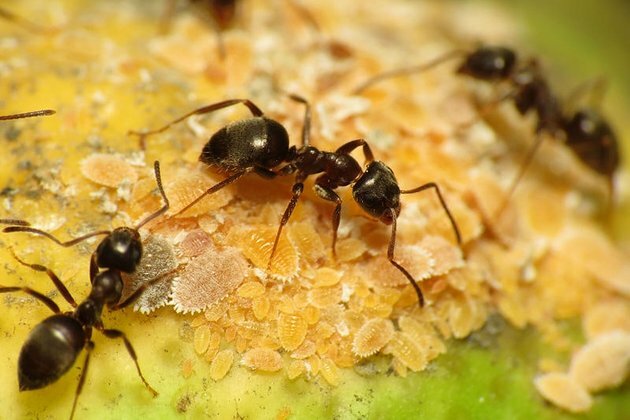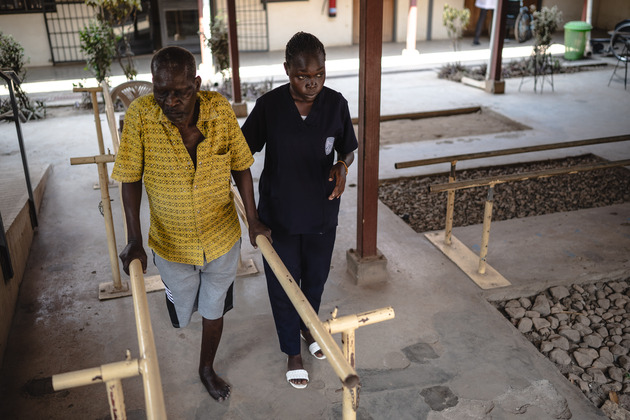Six amazing facts you need to know about ants
The Conversation
20 Jun 2019, 19:56 GMT+10

Have you have seen ants this year? In Britain, they were probably black garden ants, known as Lasius niger - Europe's most common ant. One of somewhere between 12,000 and 20,000 species, they are the scourge of gardeners - but also fascinating.
The small, black, wingless workers run around the pavements, crawl up your plants tending aphids or collect tasty morsels from your kitchen. And the flying ants that occasionally appear on a warm summer's evening are actually the reproductive siblings of these non-winged workers. Here's what else you need to know:
1. Most ants you see are female
Ants have a caste system, where responsibilities are divided. The queen is the founder of the colony, and her role is to lay eggs. Worker ants are all female, and this sisterhood is responsible for the harmonious operation of the colony.
Their tasks range from caring for the queen and the young, foraging, policing conflicts in the colony, and waste disposal. Workers will most likely never have their own offspring. The vast majority of eggs develop as workers, but once the colony is ready the queen produces the next generation of reproductives which will go on to start own colonies.
A female ant's fate to become a worker or queen is mainly determined by diet, not genetics. Any female ant larva can become the queen - those that do receive diets richer in protein. The other larvae receive less protein, which causes them to develop as workers.
2. Male ants are pretty much just flying sperm
Unlike humans, with X and Y chromosomes, an ant's sex is determined by the number of genome copies it possesses. Male ants develop from unfertilised eggs so receive no genome from a father. This means that male ants don't have a father and cannot have sons, but they do have grandfathers and can have grandsons. Female ants, in comparison, develop from fertilised eggs and have two genome copies - one from their father and one from their mother.
Male ants function like flying sperm. Only having one genome copy means every one of their sperm is genetically identical to themselves. And their job is over quickly, dying soon after mating, although their sperm live on, perhaps for years. - essentially their only job is to reproduce.
3. After sex queens don't eat for weeks
When the conditions are warm and humid, the winged virgin queens and males leave their nests in search of mates. This is the behaviour seen on "flying ant day". In L. niger, mating takes place on the wing, often hundreds of meters up (hence the need for good weather). Afterwards, queens drop to the ground and shed their wings, while males quickly die. Mated queens choose a nest site and burrow into the soil, made softer from recent rain.
Read more: The amazing secrets behind 'flying ant day'
Once underground, the queens will not eat for weeks - until they have produced their own daughter workers. They use energy from their fat stores and redundant flight muscles to lay their first batch of eggs, which they fertilise using sperm stored from their nuptial flight. It is the same stock of sperm acquired from long dead males that allows a queen to continue laying fertilised eggs for her entire life. Queens never mate again.
4. Home-making the ant way: cooperation, death and slavery
Sometimes two L. niger queens unite to found a nest. This initially cooperative association - which increases the chance of establishing a colony - dissolves once new adult workers emerge and then the queens fight to the death. More sinister still, L. niger colonies sometimes steal brood from their neighbours, putting them to work as slaves.
Slave-making has evolved in a number of ant species, but they also display cooperation at extraordinary levels. An extreme example of this is a "supercolony" of Argentine ants (Linepithema humile) which extends over 6,000km of European coastline from Italy to north-west Spain, and is composed of literally billions of workers from millions of cooperating nests.
5. Queen ants can live for decades, males for a week
After establishing her colony, the queen's work is not done and she has many years of egg-laying ahead of her. In the laboratory, L. niger queens have lived for nearly 30 years. Workers live for about a year, males little more than a week (although their sperm live longer). These extraordinary differences in longevity are purely due to the way their genes are switched on and off.
6. Ants can help humans and the environment
Ants have a major influence in ecosystems worldwide and their roles are diverse. While some ants are considered pests, others act as biological-control agents. Ants benefit ecosystems by dispersing seeds, pollinating plants and improving the quality of soil. Ants might also benefit our health, as a potential source of new medicines such as antibiotics.
So when you next see an ant, before you think to kill her, consider how fascinating she really is.
Authors: Charlie Durant - PhD Candidate, Department of Genetics and Genome Biology, University of Leicester | Max John - PhD Candidate, Department of Genetics and Genome Biology, University of Leicester, University of Leicester | Rob Hammond - Lecturer, Department of Genetics and Genome Biology, University of Leicester 
 Share
Share
 Tweet
Tweet
 Share
Share
 Flip
Flip
 Email
Email
Watch latest videos
Subscribe and Follow
Get a daily dose of Sierra Leone Times news through our daily email, its complimentary and keeps you fully up to date with world and business news as well.
News RELEASES
Publish news of your business, community or sports group, personnel appointments, major event and more by submitting a news release to Sierra Leone Times.
More InformationBusiness
SectionAlibaba releases AI model Wan 2.1 to the public
BEIJING, China: Alibaba has made its video- and image-generating AI model, Wan 2.1, publicly available, marking a significant step...
German consumer sentiment drops unexpectedly in March
BERLIN, Germany: Consumer sentiment in Germany has taken an unexpected turn for the worse heading into March despite forecasts predicting...
G20 poverty summit struggles as key finance leaders skip meeting
CAPE TOWN, South Africa: An international summit on global poverty faced setbacks this week as key finance leaders skipped the G20...
Home Depot sees sales rebound in Q4 after two-year slump
ATLANTA, Georgia: After two years of declining same-store sales, Home Depot finally saw a turnaround in the fourth quarter, fueled...
U.S. stocks rally despite Trump doubling-down on tariffs
NEW YORK, New York - U.S. stocks rallied on Friday as economic data showed the U.S. Federal Reserve has likely tamed inflation. The...
Personal Consumption Expenditures price index in January improves slightly
WASHINGTON, DC - The U.S. Federal Reserve seemingly has inflation under control with the latest econbomic data confirming little push...
Africa
SectionDale Steyn backs Afghanistan to win ICC tournament in next decade
New Delhi [India], March 1 (ANI): Afghanistan's steady rise in international cricket has caught the attention of cricketing greats,...
"No need to manufacture news, world wants to know India": PM Modi at NXT Conclave 2025
New Delhi [India], March 1 (ANI): Prime Minister Narendra Modi on Saturday highlighted India's capability to efficiently organize large-scale...
Xinhua Photo Daily | March 1, 2025
BEIJING, March 1 (Xinhua) -- A selection of the best press photos from Xinhua. A drone photo taken on Feb. 27, 2025 shows the construction...
SOUTH SUDAN-JUBA-PHYSICAL REHABILITATION CENTER
(250301) -- JUBA, March 1, 2025 (Xinhua) -- A nurse from the International Committee of the Red Cross (ICRC) South Sudan delegation...
Indian Coast Guard Ship 'Sachet' departs for Sudan with over 2 tons of life-saving medicines
New Delhi [India], March 1 (ANI): The Indian Coast Guard Ship Sachet departed for Sudan on Friday, carrying over two tons of life-saving...
US tariff hike on vehicle imports could impact Nigeria's auto market
ABUJA, NIGERIA — For longtime automotive importer David Tope, Nigeria's auto market has become increasingly difficult. He used to...













